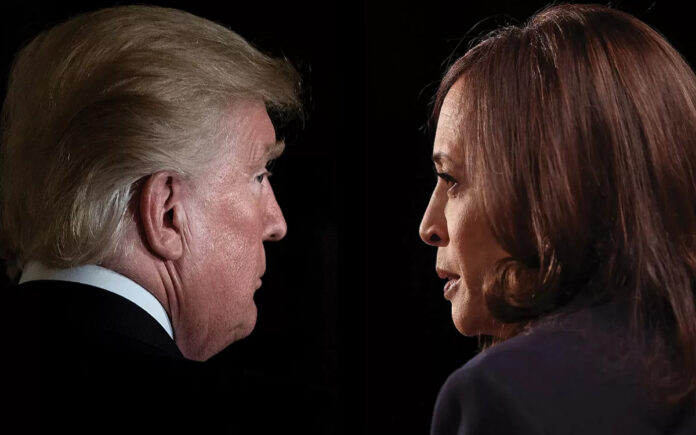New York: Many top Wall Street executives are expressing reservations about backing either candidate in the upcoming U.S. presidential election. While former President Donald Trump’s economic policies are viewed as risky, Vice President Kamala Harris remains an unknown factor, sparking concerns she may steer too far left.
Prominent figures like Bill Ackman, John Paulson, and George Soros have declared their support, but a significant number of senior executives remain undecided. They continue to assess the candidates’ economic policies and the broader implications for legal and democratic institutions, according to discussions with two dozen executives over recent weeks.
Although Trump has a record of implementing Wall Street-friendly measures, many executives fear his policies could introduce economic instability. On the other hand, Harris, who replaced President Joe Biden as the Democratic nominee in late July, is perceived as a safe option but an unpredictable one. Concerns center on her potential continuation of Biden’s regulatory crackdown on the financial industry.
Executives from both Republican and Democratic camps, including several who are publicly supporting Trump or Harris, remain divided. Some lack any clear political affiliations.
Trump vs. Harris: A Divided Wall Street
Bruce Mehlman, partner at Mehlman Consulting, a bipartisan lobbying firm, emphasized that while many expect Trump to continue his populist, protectionist, and deregulatory policies, there’s still uncertainty about Harris. “They’re eager to better understand who Harris is and what she believes,” said Mehlman, adding that Harris’ recent economic speech had not provided much clarity for Wall Street firms.
Trump, echoing his first-term policies, has promised tax cuts and deregulation. However, many executives worry these benefits could be offset by his proposed import tariffs, which may fuel inflation, while tax cuts risk expanding the U.S. deficit. Trump recently intensified his stance on tariffs, a point highlighted during a September event where billionaire Trump supporter John Paulson argued that tariffs could help reduce the deficit.
Trump campaign National Press Secretary Karoline Leavitt insisted Wall Street investors support Trump because his previous policies “fueled growth, drove down inflation, and kept more money in everyone’s pockets.”
Also Read | Greece Defies EU, Moves Ahead with Border Fence Expansion
Harris’ Economic Approach: Uncertainty for Wall Street
Harris’ economic plan, while predicted by analysts to benefit the economy overall, includes proposals to raise taxes—a move likely to affect corporate earnings and stock markets. Her tough stance on financial institutions, dating back to her days as a prosecutor, has also raised concerns among some executives that she may continue Biden’s crackdown on banking practices like hidden fees.
A Harris spokesperson pointed to endorsements from hundreds of economists and CEOs as evidence of support for her candidacy. Billionaire entrepreneur and Harris supporter Mark Cuban emphasized that higher taxes in the past did not harm stock performance, adding, “Anything that reduces the deficit is a plus.” However, he cautioned that neither candidate had detailed how they would implement their policies.
Many firms are hoping for a scenario in which a Harris White House is balanced by a Republican Senate, which could block tax hikes and push for moderate appointments.
As of late August, individuals and political action committees tied to the securities and investment sectors have contributed $8.7 million to the Biden-Harris campaign, compared to around $3 million for Trump, according to data from OpenSecrets.
Also Read | Chinese Nuclear-Powered Submarine Reportedly Sank Earlier This Year, U.S. Official Reveals
Concerns Over Democracy and Populism
Some executives are concerned not only about Trump’s economic policies but also his impact on democratic institutions. His felony conviction and role in the January 6 Capitol attack have raised questions about his commitment to the rule of law. Others have expressed discomfort with his influence on issues such as Federal Reserve independence, immigration, and abortion.
Michael Bright, CEO of the Structured Finance Association, noted that while some in the financial sector are disillusioned with Trump due to his involvement in overturning federal abortion rights, the community remains evenly split. “Many will vote ‘with their hearts’ for Harris,” Bright said, though he acknowledged the complexity of the decision.
Concerns over Trump’s potential populist approach to filling key positions also persist. While some believe Harris may stick with Biden’s progressive agency heads, others suggest she could be more pragmatic in her selections. Jon Henes, Harris’ national campaign finance chair in 2020, described her as “practical and pragmatic” and supportive of “sensible regulation.”
For Trump, some executives view the appointment of Howard Lutnick, CEO of Cantor Fitzgerald, as co-chair of his transition team as a positive sign. Lutnick is leveraging his Wall Street connections to help staff a possible second Trump administration.
Lindsey Johnson, CEO of the Consumer Bankers Association, noted that Trump could draw from a “deep well” of experienced industry professionals for his financial policy team.



